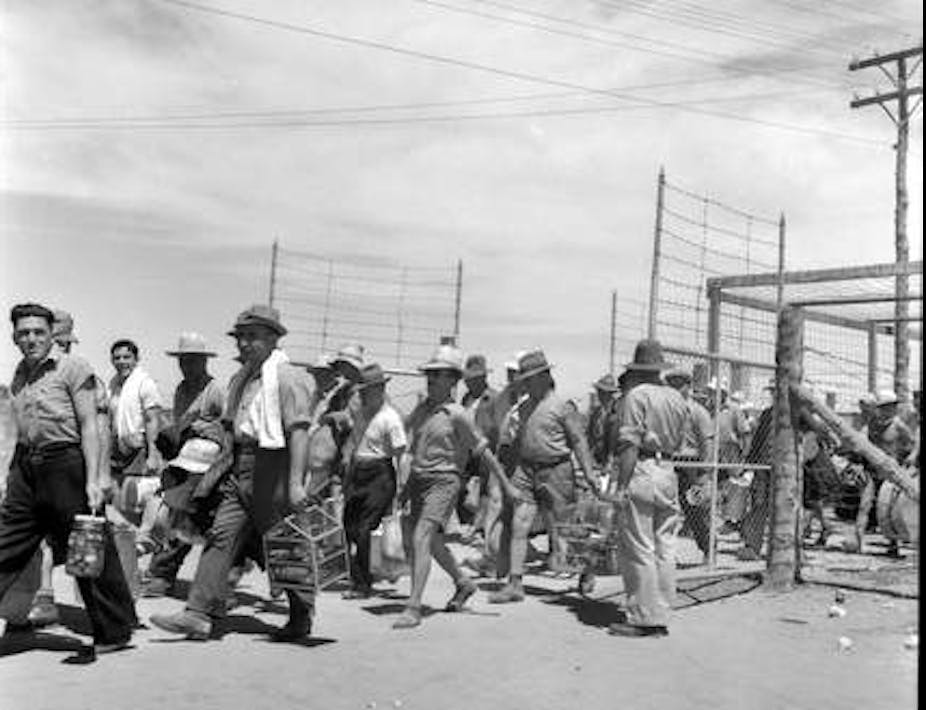Last month, the South Australian parliament unanimously accepted a bi-partisan motion moved by Labor member, Tony Piccolo, to acknowledge the wrongful internment of Italian civilians living in Australia during World War II.
This small step may usher in a new period of reconciling with the darker side of wartime Australia and help us better understand this chapter of our history.
Silent for too long
During World War II, as in the Great War, civilians from enemy nations were detained behind barbed wire regardless of age, health or political views. Italian migrants experienced popular resentment in Australia, although they had escaped Fascism and another war looming in Europe.
Monarchist Italy had fought with the British in the Great War, but the British viewed Benito Mussolini’s Fascist dictatorship differently after its invasion of Abyssinia in the mid-1930s. Britain and other European nations also had strong colonial interests in Africa which led to uneasy political relationships.
Once Italy declared war on Britain and its allies on 10th June 1940, Italian migrants in Australia became political pawns.
Heartfelt apology needed

Successive Australian governments have been silent on the issue of wartime reparation to civilians who were swept up as “enemy aliens” when their country of birth became a wartime enemy.
Piccolo’s motion to acknowledge Italian migrants’ wartime suffering at the hands of the Australian military and security services revisits WA Liberal Senator John Panizza’s original motion presented to the Hawke government in 1990, which was less successful.
It is a welcome step forward to have Italian pre-war migrants’ sufferings acknowledged by the South Australian parliament. The next stage should be full acknowledgement by our Federal Parliament, as occurred with the Stolen Generations and Child Migrants.
Regrettably, the South Australian motion stops short of a genuine heartfelt “sorry” for the many political, military errors of judgement and violations of human rights that caused incredible sufferings for migrant families in this nation.
There was limited acknowledgement of the widespread xenophobia against Italian families throughout the war years. My research has found that even after 70 years, there is still unresolved anguish for Italians who lived through that era.
The internment story
Italian internee families in Australia during the war had no access to government support. The Salvation Army offered emergency relief for destitute families, but a number of these were eventually interned at Tatura to access basic food and shelter.
Women who were left at home, barely managed to survive on farms, in businesses or as seamstresses. A few internment guards and locals also pillaged internees’ packages sent from families or the Red Cross. Vehicles, bicycles, cameras, and radios were permanently confiscated or later returned broken. Italian doctors’ medical instruments were found in private surgeries after the war, requiring lengthy legal action to be returned.
The motion also omits to mention the many sad cases of Italian deaths during internment. In some cases, the internees were denied access to essential specialist medical care. While the number of reported deaths seems relatively small, many were avoidable while others remained unreported.
There were also women and children who died during their internment at the Tatura camp, but these are never discussed. Salvatore Previtera, a Queensland internee whose child died, wasn’t allowed to attend the funeral.
Political pawns

No nation has a monopoly on unfair treatment of enemy civilians and Australia was not immune to abuses against the most vulnerable migrants from enemy nations. But must Italian migrants accept their wartime sufferings in silence simply because Fascist Italy decided to declare war on Britain?
Most pre-war Italian-Australian families suffered far more than they have ever dared to reveal until now. My research on Italian internment hopes to add to many other eminent scholars works by exploring details of the daily lives of Italian men, women and children in Australia during the war years.
Buried history
Loveday in South Australia was the largest Commonwealth internment camp in the Southern Hemisphere. Italian-Australians were arguably the largest group of almost 5,000 Italian civilians incarcerated in any Allied nation, yet this remains insignificant in Australia’s wartime story.
There are only a few of the former internees left today, now reaching their late 80s and 90s who would benefit greatly from a public acknowledgment of the past, as well as material compensation.
The time is ripe for a full and sincere apology with appropriate compensation for the Italian families who lost so much in Australia during World War II. Canada and the USA have fully apologised to Japanese, German and Italian interned civilians with reparations.
Australian Indigenous Peoples waited for 200 years for an apology. How long will interned Italian-Australians need to wait?

